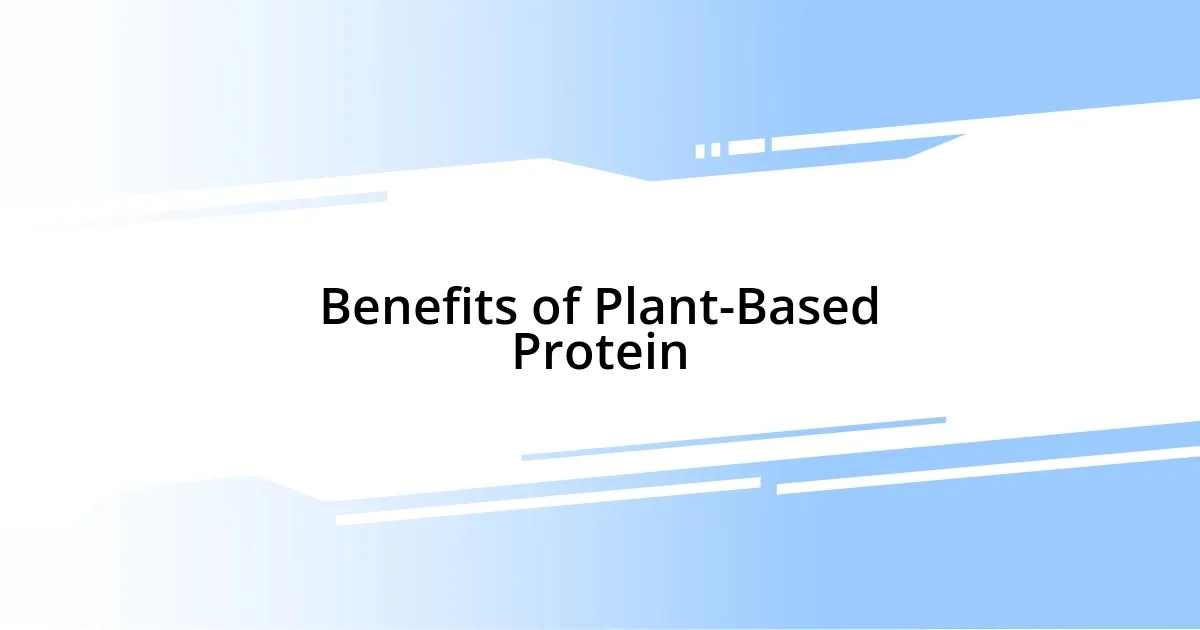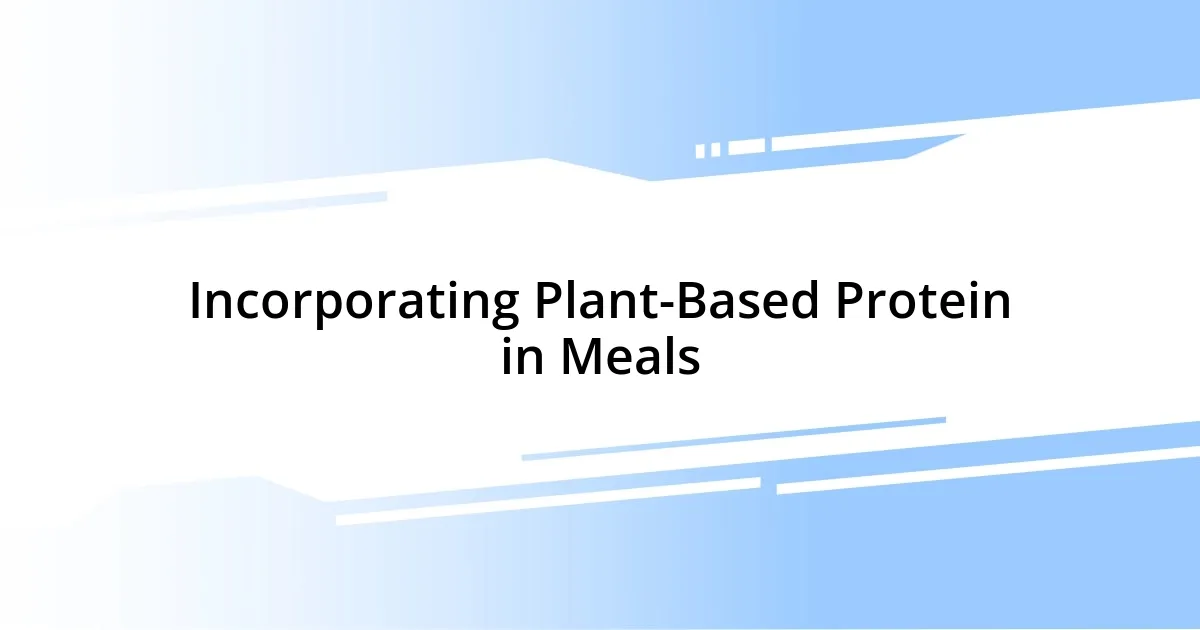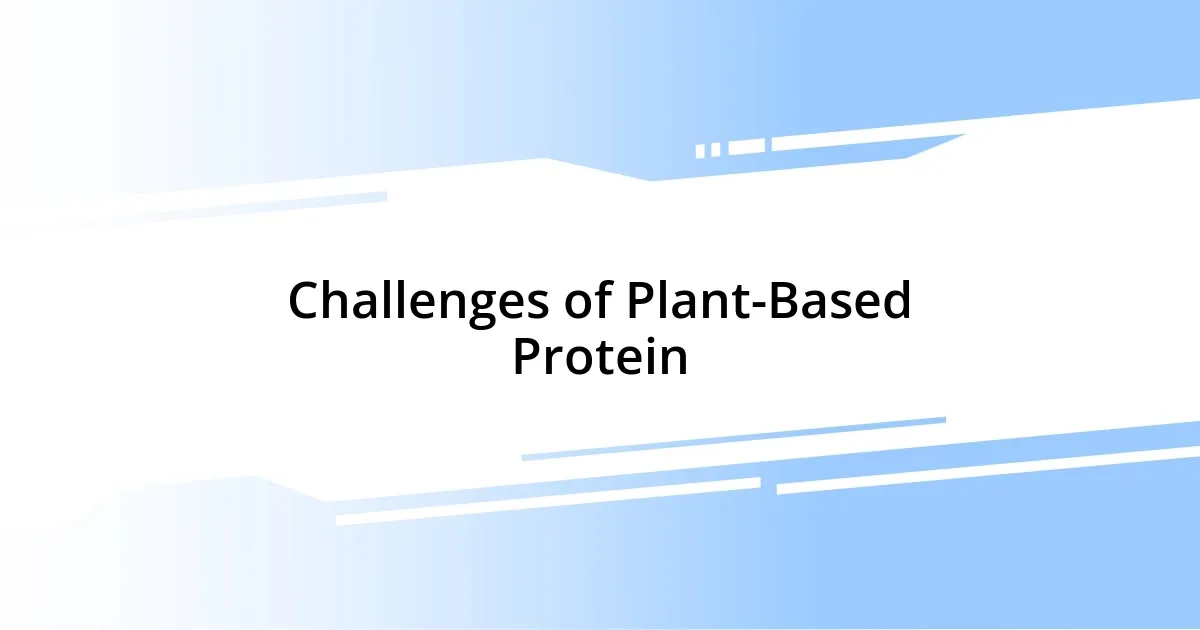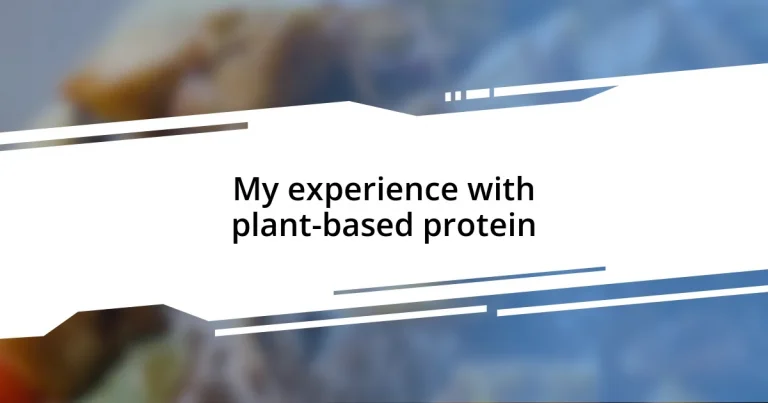Key takeaways:
- Switching to plant-based protein can boost energy, improve digestion, and support weight management while offering a sense of environmental responsibility.
- Choosing diverse sources of plant-based protein, such as lentils, chickpeas, and quinoa, enhances nutritional benefits and encourages culinary creativity.
- Incorporating plant-based proteins into meals requires planning and experimentation to maintain variety and excitement, helping to overcome initial challenges and skepticism from others.
- Personal experiences, like discovering new flavors and transforming comfort food, highlight the emotional journey and mindset shifts associated with adopting a plant-based diet.

Introduction to Plant-Based Protein
Plant-based protein has become a vibrant alternative for those looking to enhance their diets without relying solely on animal products. I remember the first time I swapped my usual chicken for chickpeas in a salad; I was pleasantly surprised by how satisfying it felt. Have you ever thought about the variety that plant-based proteins can bring to your meals?
More than just a dietary choice, embracing plant-based protein can be a transformative experience. I found that incorporating lentils into my dinner gave me a boost of energy that I didn’t expect. It’s fascinating to realize how ingredients like quinoa, beans, and nuts can not only nourish our bodies but also introduce us to new flavors and textures.
Exploring plant-based protein isn’t merely about nutrition—it’s also about connecting with food on a deeper level. When I first tried tempeh, I felt a rush of excitement, as if I were discovering a hidden gem in the culinary world. What if experimenting with these proteins could unlock a whole new way of enjoying meals, keeping your taste buds delighted while also nourishing your body?

Benefits of Plant-Based Protein
Switching to plant-based protein has surprisingly offered me a treasure trove of health benefits. I noticed improvements in my digestion after incorporating more legumes into my meals—it’s remarkable how a few simple changes can lead to such a significant shift in well-being. Plus, plant-based proteins are generally lower in saturated fat, which can positively affect heart health.
Here are some standout benefits I’ve experienced from plant-based protein:
- Improved Nutrient Intake: I’ve enjoyed a richer array of vitamins and minerals, especially when I embraced seeds and nuts.
- Weight Management: Since I started adding more plant proteins, I’ve found it easier to maintain my weight, as those meals tend to be more filling.
- Sustained Energy Levels: Quinoa in my breakfast bowl really kicked my energy levels up a notch throughout the morning.
- Environmental Impact: I feel a sense of responsibility knowing that my food choices contribute less to environmental strain; it gives me peace of mind.
- Flexibility in Cooking: I love experimenting with various recipes, and discovering how chickpeas can easily replace meat in myriad dishes has been a fun journey.
The journeys I’ve taken with plant-based dishes not only nourished my body but sparked joy in experimenting with flavors. Each meal has become an opportunity to connect with nature and my health, which is truly rewarding.

Choosing the Right Protein Sources
Choosing the right sources of plant-based protein is crucial for maximizing nutritional benefits. I remember scanning the grocery aisles, overwhelmed by the choices. From lentils to nutritional yeast, each option has its unique advantages. For instance, I discovered that black beans not only provide ample protein but also have a delightful texture that enhances my favorite taco recipe. Isn’t it refreshing to know that you can enjoy such variety while still nourishing your body?
As I explored various proteins, I began to pay attention to complementary protein sources. Combining grains like brown rice with beans creates a complete amino acid profile, which is essential for muscle repair and growth. I fondly recall hosting a dinner party where quinoa and black beans became the stars of the show; my friends were amazed at how delicious healthy eating could be! This harmonious pairing not only elevated the meal but also highlighted how thoughtful combinations can truly transform dishes.
It’s essential to reflect on your dietary preferences and goals when choosing protein sources. Some folks might prefer quick options like tofu or tempeh, while others may enjoy the rustic feel of using whole legumes. Personally, I’ve found a rhythm in preparing chickpeas in advance and tossing them into salads throughout the week. It’s a simple yet effective way to keep my meals exciting. What’s your go-to plant-based protein?
| Protein Source | Key Benefits |
|---|---|
| Lentils | Rich in fiber and iron, great for heart health. |
| Chickpeas | Excellent source of protein and versatile in recipes. |
| Quinoa | Complete protein with all essential amino acids; gluten-free. |
| Tofu | High in protein and customizable in flavor; great for stir-fries. |
| Nuts and Seeds | Packed with healthy fats, protein, and vitamins; adds crunch to meals. |

Incorporating Plant-Based Protein in Meals
Incorporating plant-based protein into my meals has been a delightful adventure. Recently, I decided to host a casual brunch, and I featured a chickpea salad that was vibrant and filling. I remember the surprise on my friends’ faces when they found out how hearty and satisfying it was, proving that plant protein can be just as fulfilling as any animal source.
I’ve also discovered how versatile plant proteins can be in everyday cooking. One of my favorite tricks is blending silken tofu into smoothies; it makes them creamy and boosts the protein content significantly without altering the flavor. Have you ever tried it? It adds a silky texture that takes your smoothie game to another level, plus it’s such a handy way to sneak in extra nutrients—who wouldn’t want that?
Meal prepping has really changed the way I incorporate plant-based proteins during the week. I take time on Sundays to cook a big batch of lentils and store them in the fridge. It’s amazing how just one component can elevate various dishes, whether I’m whipping up a quick curry or tossing them into a veggie-packed grain bowl. It’s rewarding to see how simple planning can lead to a week full of deliciously nourishing meals—don’t you love that sense of accomplishment?

Challenges of Plant-Based Protein
Adjusting to a plant-based protein diet can come with its fair share of challenges. I remember the first few weeks, feeling a bit lost and confused about how to get enough protein. I found myself reading labels obsessively, worried that I wasn’t meeting my nutritional needs. It was exhausting, to be honest. Never did I think choosing a diet would lead to so much stress over protein intake!
Another area where I struggled was incorporating sufficient variety into my meals. Initially, I often turned to the same few staples—like quinoa and lentils—almost daily. This repetitive pattern left me bored and craving more; who can enjoy a diet that feels stagnant? I quickly learned that sprucing up my meals with different spices and ingredients made all the difference. It transformed the mundane into something exciting! Now, I regularly experiment with ingredients like hemp seeds or nutritional yeast, adding not just flavor, but also a nutritional boost.
Lastly, I can’t overlook the social challenges that came with my new eating habits. I fondly recall a family gathering where the discussion around the dinner table turned into a light-hearted debate about plant-based meals. While I enjoyed explaining my choices, I also felt a twinge of frustration when some of my relatives dismissed the idea that plant protein could ever compare to meat. Have you experienced similar situations? They made me realize that sometimes it takes time for others to understand the benefits of this lifestyle. But these moments have only fueled my passion for making plant-based eating approachable and enjoyable for everyone!

My Personal Plant-Based Journey
When I first embarked on my plant-based journey, it felt like venturing into uncharted territory. I remember standing in the grocery store, staring blankly at rows of unfamiliar products. Was tempeh truly nutritious? What about my old favorites? Navigating new ingredients ignited a mix of excitement and anxiety within me. Sometimes it felt daunting, but that thrill of discovering something new became a driving force in my adventure.
One of the most poignant moments came during my first attempt at preparing a homemade black bean burger. I could practically smell the burnt edges as I stood over the stove, but the taste? Oh, the taste was something else! It was warm, hearty, and utterly satisfying; it completely changed my view on what a burger could be. Has something like that ever reframed your idea of comfort food? That single meal became a catalyst for my journey, leading me to explore endless plant-based recipes with newfound confidence.
As I began to embrace this lifestyle, I noticed shifts not just in my diet, but in my mindset. I began to appreciate not only the meals I was preparing but also the values behind them—sustainability, health, and compassion. At times, however, I faced skepticism from friends who couldn’t fathom why I would give up cheese. Their bewildered expressions often left me questioning my decision, but then I’d remind myself of the vibrant energy I felt. It was a powerful affirmation: have you ever felt such clarity in a choice that seemed unconventional? This journey has truly reshaped not just my plate, but my entire perspective on food and wellness.













